新牛津译林版英语七年级上册第四单元基础知识
牛津译林版七年级英语上册 Unit4 单词、短语、知识点复习 (无答案)
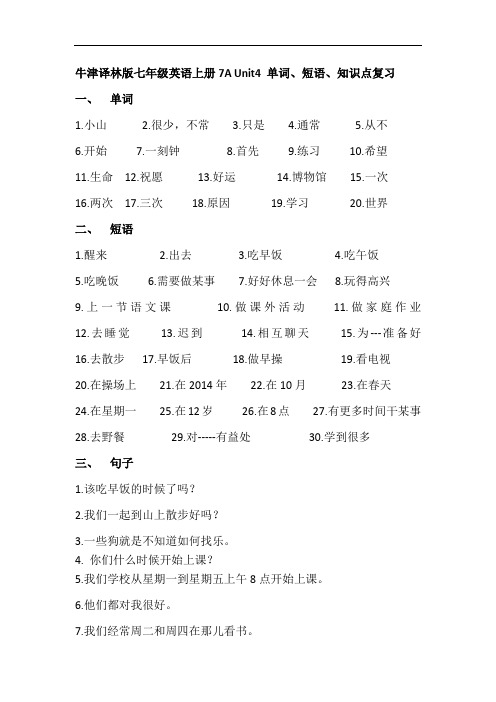
牛津译林版七年级英语上册7A Unit4 单词、短语、知识点复习一、单词1.小山2.很少,不常3.只是4.通常5.从不6.开始7.一刻钟8.首先9.练习10.希望11.生命12.祝愿13.好运14.博物馆15.一次16.两次17.三次18.原因19.学习20.世界二、短语1.醒来2.出去3.吃早饭4.吃午饭5.吃晚饭6.需要做某事7.好好休息一会8.玩得高兴9.上一节语文课10.做课外活动11.做家庭作业12.去睡觉13.迟到14.相互聊天15.为---准备好16.去散步17.早饭后18.做早操19.看电视20.在操场上21.在2014年22.在10月23.在春天24.在星期一25.在12岁26.在8点27.有更多时间干某事28.去野餐29.对-----有益处30.学到很多三、句子1.该吃早饭的时候了吗?2.我们一起到山上散步好吗?3.一些狗就是不知道如何找乐。
4. 你们什么时候开始上课?5.我们学校从星期一到星期五上午8点开始上课。
6.他们都对我很好。
7.我们经常周二和周四在那儿看书。
8.我想告诉你关于我在这儿的生活情况。
9.桑迪没有太多的时间打网球。
10.你多长时间参观一次博物馆。
四、重要知识点.1.It’s time for sth;It’s time to do sth.2.Shall we do sth?3.玩得高兴:have fun;have a goog/nice/great/wonderful time.4.be late for.5.be nice/kind to sb.6.chat with sb=talk with/to sb.7.practise doing sth.8.want=would like to do sth.9.between and .10.be good for.11.get ready for和be ready for 区别。
12.too many和too much 区别。
Unit4知识点 牛津译林版英语七年级上册

7AU4知识点New words and expressions:1.wake up.He wakes up at six o’clock.1.He wakes her up at seven o’clock.2/Shall we go fishing this afternoon?OK/Good idea! That’s all right. (No,let’s go shopping.3.He seldom goes out.He’s never late for school.4.She has breakfast/lunch/dinner.5.I need to go home early6.have a good rest7.have fun/have a good (great) time (in) doing sth.I have fun playing football8.have lessons/have an English lesson.9.after-school activities10.do one’s homeworkHe does his homework/We do our homework.He doesn’t do his homework./Does he do his homework?11.go to bed. He goes to bed at 9/He gets up at six .12.be late for He is late for school/the meeting.13.The meeting/Our school starts at 8 o’clock.14.a quarter past six/seven half past eight15.at six in th emorning/afternoon16.play football first.17.chat with him/her chat with each other18.learn from each other/ help each other19wish best wishes wish you successWish your team good luck.20.would like to go shopping.Would you like to go shopping this afternoo ?21.save my life---save their lives.22.go to the museum.23twice a week/once a year. How often does he go home?24.go on a picnic=go on picnics25.dislike playing games27.get ready for th eparty/th emeeting.28.learn a lot about the worldLanguage points: 1.It’s time for breakfast=It’s time to have breakfast2.Shall we go running/walking in the hill?3.I seldom go out /play games.4.After sleep I sleep.5.nad a good rest/He needs some milk.6.I don’t know how to have fun/what to do /how to do it/where to go7.What time do you strat lessons?8enjoy myself/enjoy working in Beijing/living in Shanghai.9.talk about playing games.10.from Monday to Friday—five days a week.11.Our lessons begin at 8:15.12.My favourite subject is English/sport is swimming.13.a lot of friends—lots of /many14.They are all nice(kind) to us---All of them are nice to us.15.a Reading Club16.read books/borrow books from the library.17.I also like playing volleyball.18.I’m in the school volleyball team=I’m a member of the school team.19.on Wednesday afternoon20.in the evening/in March/in winter/in 2202/in 2012.321.on Saturday/on 1 July/on Sunday morning/on Children’s Dayon a cold morningo/ on the afternoon of September 122.at seven o’clock/at 6 years old/at Christmas23.Thanks for your e-mail/giving me a pen/helping us with our English.24.tell you about my life/tell us about your school.25.I’m good at playing football=I play footballwell.26.He often plays football in the playground.27.She doesn’t have lunch time to play tennisShe has atime to sing.28.She’s a member of th eswimming team.She usually swims after school.29.He never plays basketball.30.He goes to her dancing lessons.31.She always dances for half an hour.32.She sometimes goes roller skating.33.Saturday ,7 November.34.Welcome to our schol/our school football match.35.There’s a volleyball match between A and B.36.He goes there by bus.37.I hope everyone can come and watch the game.38Wish our team good luck.39.What do you like to do at weekends?40.How often do you visit the Great Wall.Twice a month41.Morning exercises are good fo rus.42.Reading in th esun is bad for your eyes.43.have too much homework to do.44.so I can’t play basketball well.45.It helps me get ready for the day.48.I don’t like singing.49.It’s fun/interesting.。
2024-2025学年牛津译林版七年级英语上册+Unit+4+新版+词汇表讲解
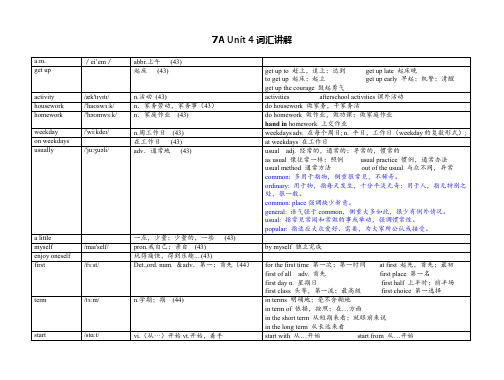
7A Unit 4词汇讲解a.m./ei’em/abbr.上午(43)get up 起床(43)get up to 赶上,追上;达到get up late 起床晚to get up 起床;起立get up early 早起;机警;清醒get up the courage 鼓起勇气activity/æk'tɪvɪtɪ/n.活动(43)activities afterschool activities课外活动housework/'haʊswɜːk/n.家务劳动,家务事(43)do housework 做家务,干家务活homework/'həʊmwɜːk/n.家庭作业(43)do homework 做作业,做功课;做家庭作业hand in homework 上交作业weekday/'wiːkdeɪ/n.周工作日(43)weekdays adv. 在每个周日; n. 平日,工作日((weekday的复数形式); on weekdays 在工作日(43)at weekdays 在工作日usually/'ju:ʒuəli/adv.通常地(43)usual adj. 经常的,通常的;寻常的,惯常的as usual 像往常一样;照例usual practice 惯例,通常办法usual method 通常方法out of the usual 与众不同,异常common: 多用于指物,侧重很常见,不稀奇。
ordinary: 用于物,指每天发生,十分平淡无奇;用于人,指无特别之处,很一般。
common: place强调缺少新意。
general: 语气强于common,侧重大多如此,很少有例外情况。
usual: 指常见常闻和常做的事或举动,强调惯常性。
popular: 指适应大众爱好、需要,为大家所公认或接受。
a little一点,少量;少量的,一些(43)myself/maɪ'self/pron.我自己;亲自(43)by myself 独立完成enjoy oneself玩得痛快,得到乐趣 (43)first/fɜːst/Det.,ord. num. &adv.第一;首先(44)for the first time 第一次;第一时间at first 起先,首先;最初first of all adv. 首先first place 第一名first day n. 星期日first half 上半时;前半场first class 头等,第一流;最高级first choice 第一选择term/tɜːm/n.学期;期(44)in terms 明确地;毫不含糊地in term of 依据,按照;在…方面in the short term 从短期来看;就眼前来说in the long term 从长远来看start /stɑːt/vi.(从···)开始vt.开始,着手start with 从…开始start from 从…开始n.开头,开端(44)at the start 开始at the start of 在…开始的时候start in 开始from the start 从一开始start up v. 开始;发动;突然站起;突然出现start at 开始于…;以…开始;因…吃惊start on v. 开始进行start for 出发,启程;动身去start out 出发;著手进行start off 出发,开始start point 出发点;起始点start doing/ to do sth 开始做某事writer/'raɪtə/n.作家(44)language/ˈlæŋɡwidʒ/n.语言(44)foreign language(s) n. 外语;外文language learning 语言学习second language 第二语言body language 身体语言natural language 自然语言spoken language 口语,口头语言;出声语言common language 共同语;公用语言native language 本国语言;本机语言;机器各单元间编码语言amazing/ə'mezɪŋ/adj.令人大为惊奇的(44)biology/baɪ'ɒlədʒɪ/n.生物学(44)biological adj. 生物学的;生物的living/'lɪvɪŋ/adj.活着的,活的(44)n. 生计;生存;生活living environment 生活环境living room 客厅,起居室living standard 生活水平,生活标准standard of living 生活水平;生活标准living space 生存空间living condition 生活条件;居住环境make a living 谋生,维持生活cost of living 生活费,生活费用for a living 为了生存;为…谋生living thing 生物living level 生活水平earn a living 谋生;活命living habit 生活习惯;生活方式alive: 其反义词为dead,指生命从奄奄一息到精力旺盛的各种状态。
牛津译林版七年级上册英语:Unit 4 My day 词汇与语法基础训练
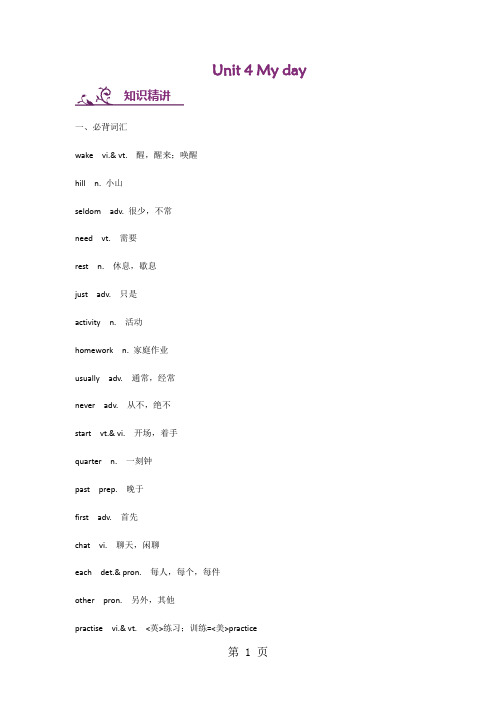
Unit 4 My day 知识精讲一、必背词汇wake vi.& vt. 醒,醒来;唤醒hill n. 小山seldom adv. 很少,不常need vt. 需要rest n. 休息,歇息just adv. 只是activity n. 活动homework n. 家庭作业usually adv. 通常,经常never adv. 从不,绝不start vt.& vi. 开场,着手quarter n. 一刻钟past prep. 晚于first adv. 首先chat vi. 聊天,闲聊each det.& pron. 每人,每个,每件other pron. 另外,其他practise vi.& vt. <英>练习;训练=<美>practicewish n. 希望,祝愿vt. 希望,祝愿life n. 〔pl. lives〕生活;生命luck n. 好运,幸运museum n. 博物馆twice adv. 两次picnic n. 野餐once adv. 一次dislike n. 不喜欢,厌恶reason n. 原因,理由ready adj. 准备好,准备完毕learn vt.& vi. 学,学习,学会world n. 世界二、重点词汇1. seldom adverb /ˈseldəm/almost never很少;几乎从来没有例句:Now that we have a baby, we seldom get the chance to go to the cinema.有了孩子以后,我们很少有时机看电影了。
We seldom receive any apology when mistakes are made.出错的时候,我们很少听到抱歉的话语。
2. activity noun /ækˈtɪvəti/the situation in which a lot of things are happening or people are moving around活泼;繁忙;热闹例句:There was a lot of activity in preparation for the Queen's visit.大家都在为准备迎接女王来访而繁忙。
牛津译林版七年级英语上册Unit4-重点词组、难点解析、语法知识点复习
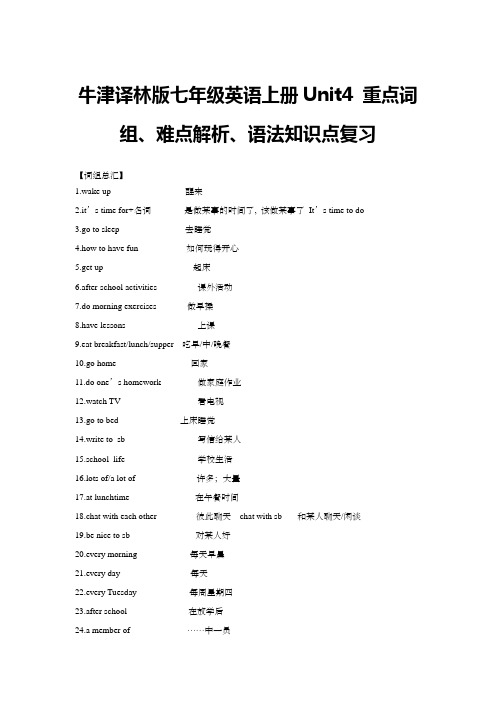
牛津译林版七年级英语上册Unit4 重点词组、难点解析、语法知识点复习【词组总汇】1.wake up 醒来2.it’s time for+名词是做某事的时间了, 该做某事了It’s time to do3.go to sleep 去睡觉4.how to have fun 如何玩得开心5.get up 起床6.after-school activities 课外活动7.do morning exercises 做早操8.have lessons 上课9.eat breakfast/lunch/supper 吃早/中/晚餐10.go home 回家11.do one’s homework 做家庭作业12.watch TV 看电视13.go to bed 上床睡觉14.write to sb 写信给某人15.school life 学校生活16.lots of/a lot of 许多;大量17.at lunchtime 在午餐时间18.chat with each other 彼此聊天chat with sb 和某人聊天/闲谈19.be nice to sb 对某人好20.every morning 每天早晨21.every day 每天22.every Tuesday 每周星期四23.after school 在放学后24.a member of ……中一员25.the Swimming Club 游泳兴趣小组26.have a good time 玩的开心27.email sb 给某人发电子邮件28.play games 玩游戏, 进行比赛29.twice a week 一周两次30.have fun 娱乐,乐趣;开心P.27-3031.listen to the radio 听收音机32.make a model plane 制作模型飞机33.read newspapers 看报read books 看书34.write emails 写邮件35.watch football matches 看球赛36.watch too much TV 看电视太多37.listen to music 听音乐38.listen to the teacher 听老师讲39.walk a dog 遛狗40.a piece of good news 一则好消息41.in the school football team 在学校足球队42.all the time 一直43.know (a lot) about…对……了解(很多)44.read comic books 看连环漫画书45.on the volleyball court 在排球场46.from...to…从……到……47.meet up with sb. 约见某人48.do their homework 做他们的作业49.under a big tree 在大树下50.go to one’s dancing lesson 去上舞蹈课51.have (no) time to do sth. 有(没有)时间做某事52.have a lot of new friends 有许多新朋友53.teach us English 教我们英语54.talk about…谈论关于……55.at home 在家56.say hello to…向……问好P.31-3757.the Class 1,Grade 7 students 七年级一班学生58.go on a trip 旅行, 旅游have one’s trip59.look at the posters 看海报60.more than 多于;超过61.twice a week 一星期两次62.the China Space Museum 中国航空博物馆63.the China Science and Technology Museum 中国科技博物馆64.next Monday 下周一65.each student 每个学生66.thank you for doing sth 为做某事而谢谢你anize the class trip 组织班级旅游68.I would like to+动词原形愿意干某事;想要干某事69.the price for………的价格70.be open/be closed 开着、关着71.look forward to…期盼;盼望72.enjoy…very much 非常喜爱……73.need to do sth 需要做……74.borrow a pen 借一支钢笔75.be busy doing 忙于做某事76.be good for 有益于77.help sb do sth 帮助某人做某事78.get ready for 准备……79.learn more about 更多了解……80.the answer to ………的答案81.the Computer Club 电脑兴趣小组【难点解析】1.Is it time for breakfast? 是吃早餐的时间了吗?it’s time for+名词, “是做某事的时间了, 该做某事了”=it’s time to+动词原形.例如:It’s time for class.是上课的时间了。
Unit4单元测试必备知识点牛津译林版英语七年级上册
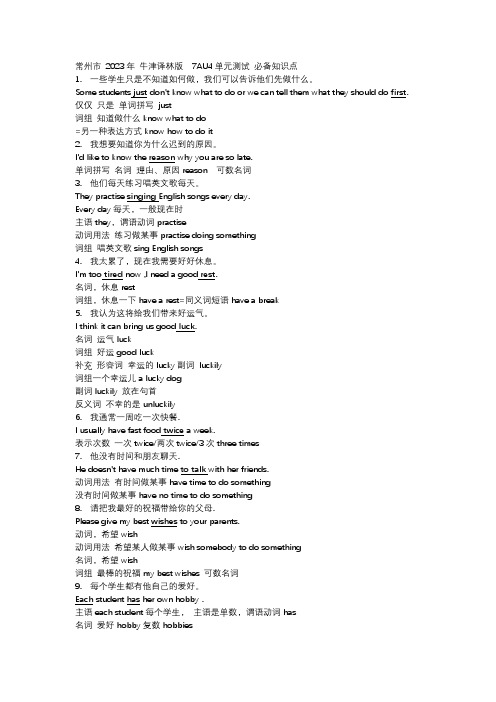
常州市2023年牛津译林版7AU4单元测试必备知识点1.一些学生只是不知道如何做,我们可以告诉他们先做什么。
Some students just don't know what to do or we can tell them what they should do first. 仅仅只是单词拼写just词组知道做什么know what to do=另一种表达方式know how to do it2.我想要知道你为什么迟到的原因。
I'd like to know the reason why you are so late.单词拼写名词理由、原因reason 可数名词3.他们每天练习唱英文歌每天。
They practise singing English songs every day.Every day每天,一般现在时主语they,谓语动词practise动词用法练习做某事practise doing something词组唱英文歌sing English songs4.我太累了,现在我需要好好休息。
I'm too tired now ,I need a good rest.名词,休息rest词组,休息一下have a rest=同义词短语have a break5.我认为这将给我们带来好运气。
I think it can bring us good luck.名词运气luck词组好运good luck补充形容词幸运的lucky副词luckily词组一个幸运儿a lucky dog副词luckily 放在句首反义词不幸的是unluckily6.我通常一周吃一次快餐.I usually have fast food twice a week.表示次数一次twice/两次twice/3次three times7.他没有时间和朋友聊天.He doesn't have much time to talk with her friends.动词用法有时间做某事have time to do something没有时间做某事have no time to do something8.请把我最好的祝福带给你的父母.Please give my best wishes to your parents.动词,希望wish动词用法希望某人做某事wish somebody to do something名词,希望wish词组最棒的祝福my best wishes 可数名词9.每个学生都有他自己的爱好。
牛津译林版七年级英语上册Unit4单元知识点总结

牛津译林版七年级英语上册Unit4Welcome to the unit1.Well, after breakfast I want to go to sleep, ...哦,早饭后我想睡觉……(1)after breakfast意为“早饭之后”,after 是介词,“在……之后”。
相关词组:after school放学之后;after class课后;after sb.跟在某人之后(2)go to sleep意为“入睡,睡着”,强调入睡的动作,这里的sleep是名词。
辨析:go to sleep, fall sleep 与go to bed①Go to sleep意为“入睡,睡着”,强调从醒着到熟睡的过程,是自然入睡。
②fall sleep意为“睡着”,强调“突然入睡”的意思。
③go to bed意为“上床睡觉”,强调上床睡觉这个动作,是否睡着不管。
2.You want to keep a diary too. 你也想记日记。
keep a diary 意为“记日记”,一般不用write a diary。
但如果是“做记录”,则可以用。
如:He is writing a diary for teaching. 他正在做教学记录。
Reading1.We always chat with each other or play games.我们总是相互聊天或做游戏。
(1)chat意为“闲谈,聊天”,既可作不及物动词,也可作名词。
作动词后带宾语时必须加介词with辨析:chat with 侧重于“闲聊”,而talk with/to 侧重于“谈话”,有时含有上级对下级,长辈对晚辈谈话的含义。
如:Our English teacher likes talking with us.我们的英语老师喜欢找我们谈话。
(2)each other意为“彼此,相互”,是相互代词,强调两者之间的“相互”,其名词所有格为each other's 。
Unit4知识点梳理2023-2024学年牛津译林版英语七年级上册
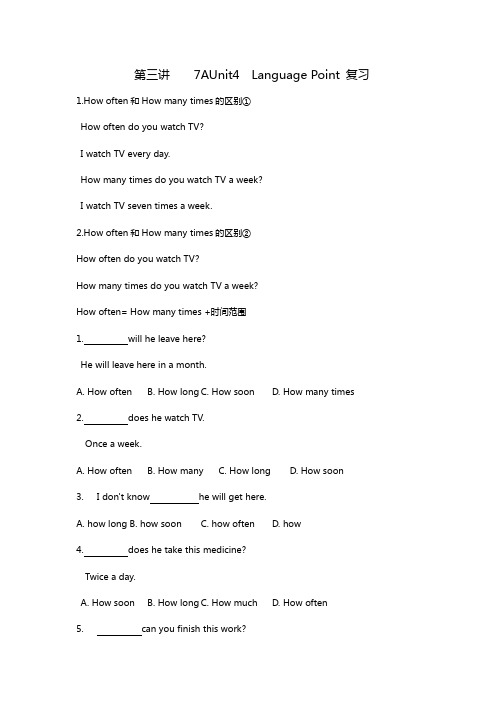
第三讲7AUnit4 Language Point 复习1.How often和How many times的区别①How often do you watch TV?I watch TV every day.How many times do you watch TV a week?I watch TV seven times a week.2.How often和How many times的区别②How often do you watch TV?How many times do you watch TV a week?How often= How many times +时间范围1. will he leave here?He will leave here in a month.A. How oftenB. How longC. How soonD. How many times2. does he watch TV.Once a week.A. How oftenB. How manyC. How longD. How soon3. I don't know he will get here.A. how longB. how soonC. how oftenD. how4. does he take this medicine?Twice a day.A. How soonB. How longC. How muchD. How often5. can you finish this work?A. How oftenB. How manyC. How longD. How soon6. have you been at this factory?I have been here since 1993A. how longB. how soonC. how oftenD. how many7. does your sister write to your parents?A. How soonB. How longC. How muchD. How often8. does it take you to finish you homework every day?.A. How oftenB. How manyC. How longD. How soon9. will he stay here?A. how longB. how soonC. how oftenD. how many10. did the meeting last?About half an hour.A. How soonB. How longC. How farD. How often3.Reading is fun.阅读是有趣的事。
Unit4知识点梳理牛津译林版七年级英语上册

牛津译林版七上Unit 4 知识点梳理1.Wake up, Eddie. 醒醒,埃迪。
wake up:“醒来”。
“唤醒某人”:如果所接宾语是人称代词,只能放在wake和up中间;如果所接宾语是名词,放在up、前后均可。
awake:adj.“醒着的”。
2.Is it time fro breakfast? 到吃早饭的时间了吗?It’s time for sth.“是做某事的时间了。
”= It’s time to do sth.It’s time for sb. to do sth.“该是某人做某事的时候了。
”3.Shall we go walking in the hills? 我们去山上散步好吗?Shall we...? “我们……好吗?”(表示征求或提出建议。
)4.I seldom go out. 我很少外出。
seldom:adv.“很少,不常,难得”(位于行为动词之前,助动词、情态动词或连系动词之后),表示否定。
go out:“出去”。
5....and then I have lunch. ……然后吃午饭。
have lunch:“吃午饭”。
→have breakfast “吃早饭”;have dinner/supper “吃晚饭”。
have:v.“吃;喝”;“有”;“举办,举行”;“度过,经历”。
三单:has。
6.After lunch, I always need a good rest. 午饭后,我总是需要好好休息。
need:v.“需要”。
need sth. “需要某物”;need to do sth. “需要做某事”;need sb. to do sth. “需要某人做某事”;sth. need(s) doing “需要”。
情态动词,“需要”,后接动词原形,常用于否定句和疑问句。
rest:n.“休息,歇息”(= break)。
have a (good) rest “(好好)休息”。
作动词,“休息”。
Unit 4 重要语法精讲 (时间介词 频度副词) 七年级上册英语单元核心知识(牛津译林版)

in 2023 in June in autumn in the morning/afternoon/evening
01 时间介词in/on/at
on用于
星期 某一天 某一天的早中晚夜 被天气、季节等修 饰的早中晚夜 还有Day的节日
on Sunday on September 10th on the afternoon of Jnue 1st on a summer morning on a cold night on Children’s Day
1. There is a lot of snow _i_n___ winter. 2. Tom uaually have a rest __a_t __ noon. 3. We have a party _o_n___ the afternoon of June 1st. 4. Is your birthday _/____ this Friday? 5. —What‘s the time now?—It’s /____ 13 o’clock. 6. We meet _o_n___ a sunny morning.
04 随堂练习 填写适当的时间介词in/on/at,不需要介词的用“/”表示
6. Do you visit your grandparents _a_t__ the Spring Festival. 7. Tina often gets up _a_t___ half past six. 8. —What day is today? —It’s _/____ Monday. 9. She is going to Shanghai __o_n__ the morning of Mar. 13. 10. I have a PE lesson _o_n___ Tuesday afternoon.
译林牛津版七年级上册英语Unit 4 单元词句梳理
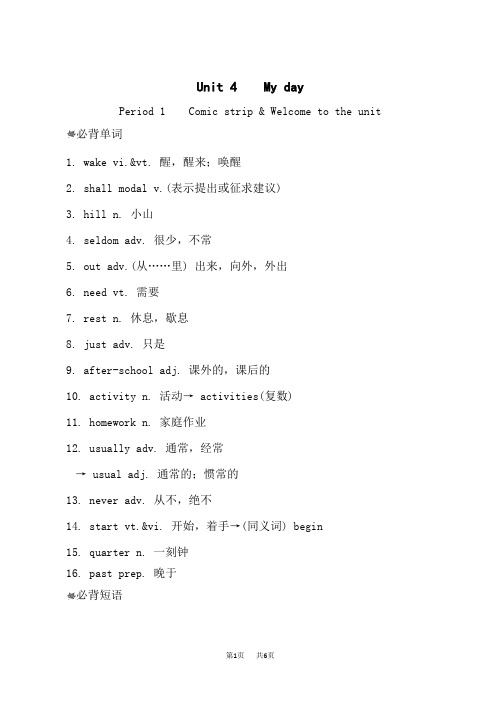
Unit 4 My dayPeriod 1 Comic strip & Welcome to the unit 必背单词1. wake vi.&vt. 醒,醒来;唤醒2. shall modal v.(表示提出或征求建议)3. hill n. 小山4. seldom adv. 很少,不常5. out adv.(从……里) 出来,向外,外出6. need vt. 需要7. rest n. 休息,歇息8. just adv. 只是9. after-school adj. 课外的,课后的10. activity n. 活动→ activities(复数)11. homework n. 家庭作业12. usually adv. 通常,经常→ usual adj. 通常的;惯常的13. never adv. 从不,绝不14. start vt.&vi. 开始,着手→(同义词) begin15. quarter n. 一刻钟16. past prep. 晚于必背短语17. wake up 醒来18. go out 出去;熄灭19. have fun 玩得高兴20. have breakfast 吃早饭21. get up 起床22. have lessons 上课23. do after-school activities 做课外活动24. do homework 做作业25. be late for 迟到必背句子26. Is it time for breakfast?是吃早饭的时间了吗?27. Shall we go walking in the hills?我们去山里散步好吗?28. I seldom go out.我很少出去。
29. I always need a good rest.我总是需要好好休息一下。
30. Some dogs just don’t know how to have fun.一些狗就是不知道怎样寻找乐趣。
+Unit+4+Comic--Reading+知识点总结 牛津译林版七年级英语上册

Unit 4 Comic--Reading 知识点总结课时11.wake /weɪk/ vi. & vt. 醒,醒来;唤醒e.g. My mum often wakes me up at seven o’clock.我妈妈经常在七点钟叫醒我。
wake up 还可作及物动词短语,意为“叫醒”。
如果宾语是名词,可以放在wake 与up 中间,也可放在up 之后;如果宾语是人称代词,则必须放在wake 与up 中间,且用宾格形式。
wake up 是“动词+ 副词”构成的短语。
wake up 表示“醒过来,醒来”时可单独使用,其中wake 是不及物动词。
e.g. The baby is sleeping. Please don’t wake him up.婴儿正在睡觉,请不要弄醒他。
I want to try it on. 我想试穿一下。
与wake up 结构类似的短语有:try on 试穿put on 穿上turn on/off 打开/关闭put away 把……收起来2.It’s time for... 是……的时间了。
/ 该……了。
Is it time for ...? 到……的时间了吗?是固定句型It is time f or sth.“该做某事了。
/做某事的时间到了。
”的一般疑问句句式。
It is time for 后面只能接名词或代词;当后面接动词时,用固定句式“It is time to do sth.”。
It is time for sb. to do sth. 表示“该是某人做某事的时间了/ 某人做某事的时间到了”。
e.g. It is time for school.=It is time to go to school. 该去上学了。
It is time for the students to play games.学生们做游戏的时间到了。
3.seldom /'seldəm/ adv. 很少,不常seldom 表示否定意义,在构成反意疑问句时,附加问句要用肯定形式。
牛津译林版七年级英语上册Unit4知识点汇总
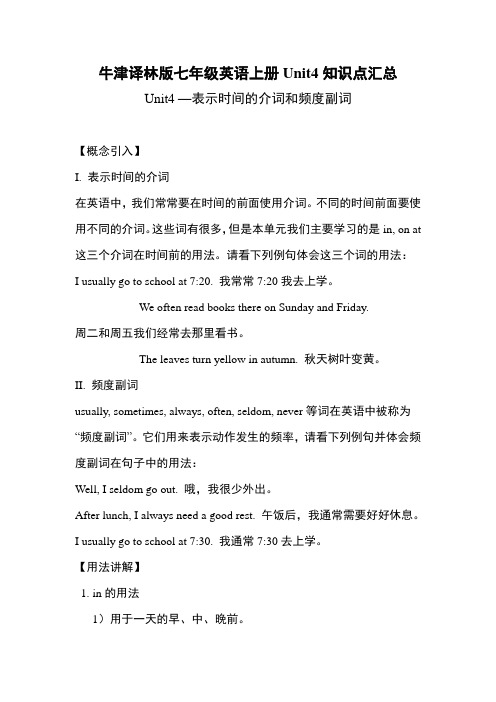
牛津译林版七年级英语上册Unit4知识点汇总Unit4 —表示时间的介词和频度副词【概念引入】I. 表示时间的介词在英语中,我们常常要在时间的前面使用介词。
不同的时间前面要使用不同的介词。
这些词有很多,但是本单元我们主要学习的是in, on at 这三个介词在时间前的用法。
请看下列例句体会这三个词的用法:I usually go to school at 7:20. 我常常7:20我去上学。
We often read books there on Sunday and Friday.周二和周五我们经常去那里看书。
The leaves turn yellow in autumn. 秋天树叶变黄。
II. 频度副词usually, sometimes, always, often, seldom, never等词在英语中被称为“频度副词”。
它们用来表示动作发生的频率,请看下列例句并体会频度副词在句子中的用法:Well, I seldom go out. 哦,我很少外出。
After lunch, I always need a good rest. 午饭后,我通常需要好好休息。
I usually go to school at 7:30. 我通常7:30去上学。
【用法讲解】1. in的用法1)用于一天的早、中、晚前。
例如:We have English class in the morning. 我们早上上英语课。
My mother goes to work in the afternoon. 我妈妈下午去上班。
She watches TV in the evening. 她晚上看电视。
2)用于月份、季节、年份前。
例如:The flowers come out in spring. 花在春天绽放。
The Children’s Day is in May. 儿童节在五月。
They came to China in 1998. 他们在1998年来到了中国。
牛津译林版英语七年级英语上册unit4重点知识汇总

牛津译林版英语七年级英语上册unit 4 要点知识整理汇总一.短语1. wake up 醒来2. wake sb. up叫醒某人3. Its time for sth.It ’ s time (for sb.) to do sth是.(某人)干某事的时候了4. go walking in the hills 去山上漫步5. seldom go out 极少出门6. need a good rest 需要好好歇息=need to have a good rest7. need to do sth. 需要做某事8. write to her online friend 写信给她的网友9. do morning exercises 做晨操10. do eye exercises 做眼保健操11. do some exercise 锻炼12. have lessons 上课13. start (begin) lessons 开始上课14. do after-school activities 做课外活动15.be never late for work / school上班 / 上学从不迟到16.one of.. .之一。
后接可数名词复数17. be all nice to sb. 都对某人很好18. chat with sb. 和某人聊天19. chat with each other 相互聊天20. help each other 相互帮助play in the playground 在操场上玩be in the school volleyball team是校排球队成员=be a member of the school volleyball team23. practise after school放学后训练practise doing sth.练习/ 训练做某事24. on Wednesday afternoon在周三下午have a good time doing sth=have fun doing sth.做某事过得快乐26. in spring / summer / autumn / winter27. at 6 years old 在六岁 =at 6=at the age of 628. all the best 全部顺利,万事如意29.have much time to do sth. 有好多时间做某事30.have no time to do sth. 没有时间做某事31. go to her dancing lessons 去上舞蹈课32. dance for half an hour 跳舞半小时33. go roller skating 去溜旱冰34. go walking 去漫步35.between...and... 在...和...之间36. visit a museum 观光博物馆37.go on picnics with my family twice a month 一个月两次和我家人去野餐38. at noon 在正午39. at night 在夜里40. at work 在工作42.be bad for sb. 有 ..害43. help sb. get ready for sth 帮助某人为 ...做好准备44.get ready to do sth 准备好做某事 =be ready to do sth.45. learn a lot about sth 对于某事认识好多46. learn more about sth. 对于某事认识更多47. too much homework 太多作业48. too many lessons 太多课49. much too cold (hot)太冷(热)二.句子:1.Some dogs just don ’ t know how to have有些fun狗.就是不知道如何玩乐。
Unit4 短语句型默写2024-2025学年新版牛津译林版七年级英语上册

7A Unit4School daysWelcome to the unit1 学习是打开世界的钥匙Learning is the key to unlocking the world.2 ★做某事的关键the key to doing...3 学习如何谈论我们的学校生活learn how to talk about our school life4 吃早饭/午饭/晚饭have breakfast/ lunch / dinner 【三餐前不加the】5 ★做早操/眼保健操do morning/eye exercises 【exercise:操练,练习可数】6 ★做更多的锻炼do/take more exercise 【exercise:锻炼不可数】7 ★做课后活动do after-school activities8 帮助家务help with housework9 ★在工作日on weekdays10 在周末at/on weekends = at/on the weekend11 去短暂的慢跑go for a short jog12 ★加入排球俱乐部join the V olleyball Club13 读了一点read a little14 ★玩的开心enjoy oneself = have fun = have a good time15 ★做某事的方法way to do...= way of doing=how to do...16俱乐部活动是我玩的愉快并结交朋友的好方法Club activities are s good way for me to enjoy myself and makefriends.Reading17 我的第一个学期my first term18 我最喜欢语文I like Chinese best.= My favourite subject is Chinese.19 阅读许多著名作家的作品read the works of many famous writers20 ★因为.....而著名be famous for......21 ★作为.....而著名be famous as......22 中国语言令人惊奇The Chinese language is really amazing.23 研究许多活物study many living things24 了解大自然learn about nature25 ★练习做某事practise doing....26 有一个野外考察have a field trip27 ★动身去,到....地方去leave for28 ★收到某人来信hear from sb = get a letter from sb.29 ★希望做某事hope to do ..... 【没有hope sb to do sth】30 希望不久收到你的来信Hope to hear from you soon.31 ★我在校排球队I am in the school volleyball team.=I am a member of the school volleyball team32 明天早晨我们将到公园去摘苹果Tomorrow morning we will leave for a farm to pick apples.33 我们在周二和周四上生物课We have Biology classes on Tuesdays and Thursdays.34 我想要告诉你关于我的学校生活I would like to tell you about my school life.35 ★说一点中文speak a little Chinese36 ★迫不及待做某事can’t wait to do...37 一切顺利All the bestGrammar ---Further studyFurther study38 ★没有许多时间去打网球don’t have much time to play tennis39 在体育场on the sports field40 ★去溜旱冰go roller skating41 跳舞半小时dance for half an hour42 学习如何种植苹果learn how to grow apples43 长大grow up44 帮助种树help plant trees45 在学校网站上on the school website46 看视频watch a video 【video 复数videos】47 参观田野have a tour of the fields48 带一些苹果回家take some apples home49 我喜欢呆在外面I like being outside.50 ★亲近大自然是好的It’s nice to get close to nature.51 ★享受和平和安静enjoy the peace and quiet52 ★每个人都竭尽全力让事情变得更好Everyone tries their best to make things better.53 竭尽全力,尽某人最大努力做某事try one’s best to do....54 ★有时候野外考察对我来说太累了Sometimes field trips are too tiring for me.55 保持我们学校区域干净感觉很好It feels good to keep our school area clean.56参加take part in = join in57帮助我学习如何照料植物help me learn how to take care of plants58轮流去做不同的值日任务take turns to do different chores59小组合作work in groups60给植物浇水water the plants61清空垃圾桶empty the bins62通过值日,我们每个人都为班级做事并学会团队合作We each do something for our class and learn about teamworkthrough chores.7A Unit4School daysWelcome to the unit1 学习是打开世界的钥匙2 ★做某事的关键3 学习如何谈论我们的学校生活4 吃早饭/午饭/晚饭5 ★做早操/眼保健操6 ★做更多的锻炼7 ★做课后活动8 帮助家务9 ★在工作日10 在周末11 去短暂的慢跑12 ★加入排球俱乐部13 读了一点14 ★玩的开心15 ★做某事的方法16俱乐部活动是我玩的愉快并结交朋友的好方法Reading17 我的第一个学期18 我最喜欢语文19 阅读许多著名作家的作品20 ★因为.....而著名21 ★作为.....而著名22 中国语言令人惊奇23 研究许多活物24 了解大自然25 ★练习做某事26 有一个野外考察27 ★动身去,到....地方去28 ★收到某人来信29 ★希望做某事30 希望不久收到你的来信31 ★我在校排球队32 明天早晨我们将到公园去摘苹果33 我们在周二和周四上生物课34 我想要告诉你关于我的学校生活35 ★说一点中文36 ★迫不及待做某事37 一切顺利Grammar ---Further studyFurther study38 ★没有许多时间去打网球39 在体育场40 ★去溜旱冰41 跳舞半小时42 学习如何种植苹果43 长大44 帮助种树45 在学校网站上46 看视频47 参观田野48 带一些苹果回家49 我喜欢呆在外面50 ★亲近大自然是好的51 ★享受和平和安静52 ★每个人都竭尽全力让事情变得更好53 竭尽全力,尽某人最大努力做某事54 ★有时候野外考察对我来说太累了55 保持我们学校区域干净感觉很好56参加57帮助我学习如何照料植物58轮流去做不同的值日任务59小组合作60给植物浇水61清空垃圾桶62通过值日,我们每个人都为班级做事并学会团队合作。
Unit4重要知识点牛津译林版七年级英语上册

U41.wake up 醒来,叫醒(名随代中)wake him up wake Tom up/wake up Tom类似结构:try on put on take off2.It’s time for sth=It’s time to do sth➡It’s time for sb to do sth3.in the hills在山里4.go to sleep入睡(强调睡着)go to bed强调去睡觉这个动作sleep (强调过程)一般用于现在进行时Simon is sleeping,don’t wake him up.5.sleep late睡懒觉stay up late熬夜6.频率副词:never<seldom<often<usually<always be动词/助动词之后;行为动词之前7.go out出去8.need sb/sth需要某人/某物need to do sth需要做某事need sb to do sth需要某人做某事9.以Must 开头的一般疑问句,肯定回答:Yes,...must. 否定回答:No,...needn’t.10.rest ①名词休息have/take a rest休息一下②adj.剩下的The rest of students are in the classroom.11.don’t know how to do sth不知如何做某事特殊疑问词+to do sth12.have fun/have a good/great time doing sth做某事很愉快13.have/eat breakfast/lunch/dinner/supperhave a big dinner吃大餐14.do morning exercises 做早操do eyes exercises做眼保健操do exercise锻炼15.do afterschool activities 做课外活动16.时间表达法:分钟数≤30:分钟数+past+钟点数分钟数>30:60分钟数+to+下一个钟点数8:15 a quarter past eight/fifteen past eight/eight fifteen8:45 a quarter to nine/fifteen to nine/eight fortyfive17.write to sb写信给某人18.a day at school在学校的一天19.at eight in the morning在早上8点钟20.from Monday to Friday从周一到周五21.on+星期几/星期几的某个时刻On Monday On Friday afternoonon every Monday=on Mondays在每周一22.first ①adv. 作状语②adj. 第一的the first第一at first首先for the first time第一次sb's first time某人的第一次first of all首先23.be nice / friendly to sb对某人好/友好24.chat with each other互相聊天25.in the playground在操场上(有围栏)26.practise ①vt.练习practise doing sth练习做某事②➡n. practice27.best wishes(to sb)wish sb sth. ➡wish sb good luck27.life ①不可数名词“生活”②可数名词“生命”复数:lives28.have (a great)fun29.luck(不可数名词)➡lucky(adj.幸运的)➡luckily(adv.幸运地)反:unlucky 反:unluckilygood luck好运bad luck 倒霉good luck with sth 祝某事顺利good luck to sb祝某人好运30.对频率提问:how often对时长提问:how long过...多久;how soon31.twice a month一月两次32.go for/on a picnic去野餐have a picnic野餐33.【交叉翻译】a car in the park停在公园里的一辆车 a nurse at work 在工作的护士34.dislike ①n. What’s your dislike?②vt. dislike doing sth讨厌做某事dislike sb doing sth讨厌某人做某事35.be good for...对..有好处be bad for...对..有坏处be good to sb对某人好=be nice to sb36.be/get ready for sth为某事做好准备get sth ready for sb.为某人准备好某物get ready to do sth准备好做某事be ready to do sth ①准备好做某事②乐意做某事37.learn a lot about the world学到许多有关世界(的知识)learn to do sth学习做某事learn from sb向某人学习learn from each other互相学习38.in the world(在)世界上a map of the world世界地图all over the world=around the world全世界39.39.on Children’s Day在儿童节40.at Christmas在圣诞节41.时间介词in,on,at的用法42.频率副词:never<seldom<sometimes<often<usually<always 用法:be动词,情态动词,助动词之后;行为动词之前提问:How often43.go home➡go to one’s home walk home➡walk to one’s home 地点副词(home,here,there)前不能直接加介词44.take time to exercise花时间锻炼45.open/close 开/关(门,窗,盒子等)turn on/off 开/关(电器类名词)be tired疲倦,累feel tired感到累一、单项选择( )21. Every morning his mother_______ at sixA. wake him upB. wakes he upC. wakes up himD. wakes him up( )22. We students should not watch_______ TV or_______ films on weekdays.A. too much; too muchB. too many; too manyC. too much; too manyD. too many; too much( )23. It's 12:00 now. It's time_______ lunch.A. to haveB. hasC. forD. A& C( )24.Tom_______ a dog. _______ name is Eddie.A. has, ItsB. have; It'sC. has; It'sD. have; Its( )25. Eddie is Hobo's master. He knows how to_______ Hobo.A. look atB. look forC. look overD. look after( )26. He enjoys_______ with his friends and_______ ice creams with them.A. chating; eatingB. chatting; eatingC. chatting; eatingD. chating; eatting ( )27. Chinese and History are my_______ lessons. I like them_______.A. favourite, bestB. favourites, bestC. favourites, the bestD. the best, favourite ( )28. They always do_______ activities_______.A. afterschool; after schoolB. afterschool; afterschoolC. after school; after schoolD. after school; afterschool( ) 29. We always do some reading_______ every morning.A. onB. inC. /D. for( )30. Look, that's Mike, your classmate. Yes: Let's go and say hello to_______.A. himB. heC. herD. hers( )31. _______ does he go to fly kites? _______ a month.A. How long; One timeB. How soon; OnceC. How often; Once timeD. How often; Once ( )32. Amy studies very hard. She usually_______ at 10. 00 p. m. .A. plays volleyballB. gets upC. goes shoppingD. goes to bed( )33. Kitty goes to the Reading Club twice a week. She is very good at_______ books.A. readB. readsC. readingD. to read( )34. We'll have_______ fun in English this term.A. a lotB. lots ofC. a lots ofD. many( )35. Your brother speaks English very well.Yes, so he does. He practices _______ English every day.A. speakingB. speakC. speaksD. to speak( )36. Mum wants to make a cake. She needs_______ some eggs.A. buyB. buysC. to buyD. buying( )37. How often does the girl eat fish? _______.A. TwiceB. A dayC. OftenD. Two hours( )38. Do you usually_______ the bus to work every day? No, _______ I go there by car.A. take; sometimesB. by; sometimesC. by; sometimeD. take; sometime ( )39. I want_______ the classroom. Would you like_______ me , please?A. clean; helpB. to clean; helpC. clean; to helpD. to clean; to help ( )40. I read the newspaper_______ breakfast.A. asB. forC. atD. in【答案】21~25 DCDAD 26~30 CAACA 31~35 DDCBA 36~40 CCADC二、句型转换1. The boy with a special mask is my brother.(对画线部分提问)________ ________ is your brother?2. The girl is wearing a white blouse.(改为同义句)The girl ________ ________ a white blouse.3. The girl usually has milk and cakes for breakfast.(对画线部分提问)________ does the girl usually ________ for breakfast?4. You look so cool in the pair of jeans.(改为同义句)The pair of jeans ________ so cool ________ you.5. Millie seldom eats fish.(对画线部分提问)________ ________ does Millie eat fish?【答案】Which boy; is in; What have; looks on; How often三、用所给单词的适当形式填空81.I would like_______(play) puter games.82. What about_______ (go) on a picnic next Sunday?83. We read English at 8:00 a.m. Then our first lesson_______ (begin) at 8: 25 a.m.84. English is very_______ (interest). I like it very much.85. It's our_______(one) English lesson. I think I will be interested in it.86. As a famous dancer, she needs ___________ (dance) for two hours every day87. He doesn’t have much time ___________ (listen) to music from Monday to Friday88. How long does it take you ___________ (play) volleyball every Tuesday afternoon?89. You should practise ___________ (speak) English every day.90 Sometimes I spend my free time_________(chat) with my online friends.【答案】81. to play 82. going 83. begins 84. interesting 85. first86. to dance 87. to listen 88. to play 89. speaking 90. chatting四、根据汉语提示、首字母提示和句意,写出合适的单词7l .We_______(练习)speaking English every day.72.He goes to the English Club_______(两次)a week.73.I like this_______(活动).Do you want to join us?74.Please give my best_______(祝愿)to your grandparents.75. What's the time now? It's a_______(一刻钟)past eight.76. Every morning I do morning e_______ at 7:00 at home.77. After school, the teachers often give us some h_______ to do.78. I am very tired. Can I have a r_______?79. I read newspapers every day. I think we can I _______ a lot from that80. They can help us get r for the day.【答案】71. practise 72. twice 73. activity 74. wishes 75. quarter76. exercises 77. homework 78. rest 79. learn 80. ready五、完形填空I’m a middle school student. My __41 _ is big and nice. There are six__42__ in our grade. I’m in Class One. Our English teacher is Miss Wang. There are __43__ students in our class, twentyone girls and twentyfive boys. __44__ of the girls is English. Her __45__ is Lily.It’s four o’clock in the __46__. Some boys are playing football. Boys love __47__football. Some of them are really good at it.__48__ are the girls? They are in the classroom. Miss Wang is in the __49__, too. She wants to teach them to __50__ an English song.( ) 41. A. school B. home C. club D. factory( ) 42. A. students B. boys C. classes D. classrooms( ) 43. A. forty B. fortytwo C. fortysix D. no( ) 44. A. None B. One C. Some D. Many( ) 45. A. work B. bag C. hobby D. name( ) 46. A. morning B. afternoon C. night D. evening( ) 47. A. flying B. borrowing C. playing D. scoring( ) 48. A. What B. How C. Who D. Where( ) 49. A. office B. team C. classroom D. playground( ) 50. A. read B. write C. sing D. have【答案】41~45. ACCBD 46~50. BCDCC六、阅读理解( C )Do you know about Big Ben? Now Let me tell you about it.Big Ben is not the name of a man. It is the name of a huge clock in London. London is the capital of the UK. This clock has four faces, so nomatter (无论) where you stand, you can read the time on the face of Big Ben. Each face is the size of a doubledecker(双层的) bus. The hands are about four metres long. It is about the size of two people standing on top of each other. If you go to London, you may want to visit the House of Parliament(国会大厦). That is where you will find Big Ben sitting at the top of the clock tower(塔) in the House of Parliament. You will hear it as well as see it. The big clock makes such a loud sound, "Ding Dong, Ding Dong," when it goes every quarter(四分之一) of an hour. The clock was named after a big man. He was Sir Benjamin Hill. He did much building work in London many years ago.()61. Big Ben is _______.A. a doubledecker busB. a huge clockC. the name of BenD. a building( )62. The clock strikes(敲响) every _______ of an hour.A. ten minutesB. fifteen minutesC. thirty minutesD. fortyfive minutes()63. Which of the two words mean the same as "large"?A. doubleB. loudC. hugeD. small()64. You can read the time of Big Ben _______.A. at the top of the towerB. in the House of ParliamentC. on the hands of the huge clockD. on the four faces of the clock( )65. The title (标题) of the passage may be _______.A. Big BenB. A clockC. Sir Benjamin HillD. The Capital of the UK( D )It is Sunday today. It is a fine day. We don’t have any classes. We get up early and don’t have a big breakfast, only coffee, bread and butter. Now we are in the park. There are a lot of people in it.First we go boating on the lake. Then we sit under the tree and have our picnic lunch. Some boys swim in the lake and others fly kites. Peter is very good at flying kites, and he is flying a very nice one with Mike over there. Sam and Bill like swimming. They are now swimming in the lake. How well they are swimming !What are Lily and Lucy doing? Look, they are talking with some Chinese students. They are learning to speak Chinese. Miss Wang is helping them. Simon and Millie are sitting under a tree. They are looking after the clothes for the swimmers. ( ) 66. Where are Sam and Bill?A. They are under a big tree.B. They are talking to their English friends.C. They are playing in the park.D. They are swimming in the lake.( ) 67. What are Lily and Lucy doing?A. They are having an English lesson.B. They are talking in Chinese.C. They are talking with Miss Green.D. They are singing English songs.( ) 68. What is under the tree near the lake?A. A dictionary.B. The children’s clothes.C. A chair and a desk.D. Some food and drinks.( ) 69. Which of the following is NOT right?A. It’s a fine day.B. Some Chinese students are talking to Lily and Lucy.C. There are no girls in Sam’s class.D. Children can swim in the lake of the park.( ) 70. Which of the following is right?A. No girls are in the park.B. No one is swimming in the parkC. It is Sunday today.D. Miss Wang is not in the park.【答案】6165 BBCDA 6670 DBBCC。
牛津译林版七年级英语上册Unit4单元知识点复习
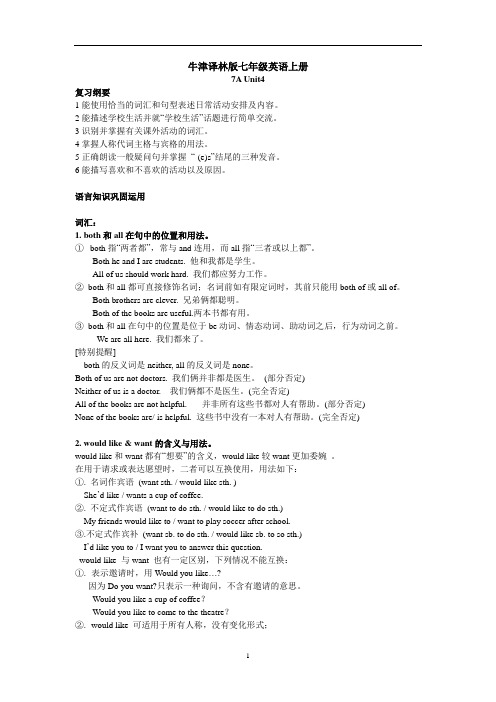
牛津译林版七年级英语上册7A Unit4复习纲要1能使用恰当的词汇和句型表述日常活动安排及内容。
2能描述学校生活并就“学校生活”话题进行简单交流。
3识别并掌握有关课外活动的词汇。
4掌握人称代词主格与宾格的用法。
5正确朗读一般疑问句并掌握“-(e)s”结尾的三种发音。
6能描写喜欢和不喜欢的活动以及原因。
语言知识巩固运用词汇:1. both和all在句中的位置和用法。
①both指“两者都”,常与and连用,而all指“三者或以上都”。
Both he and I are students. 他和我都是学生。
All of us should work hard. 我们都应努力工作。
②both和all都可直接修饰名词;名词前如有限定词时,其前只能用both of或all of。
Both brothers are clever. 兄弟俩都聪明。
Both of the books are useful.两本书都有用。
③both和all在句中的位置是位于be动词、情态动词、助动词之后,行为动词之前。
We are all here. 我们都来了。
[特别提醒]both的反义词是neither, all的反义词是none。
Both of us are not doctors. 我们俩并非都是医生。
(部分否定)Neither of us is a doctor. 我们俩都不是医生。
(完全否定)All of the books are not helpful. 并非所有这些书都对人有帮助。
(部分否定)None of the books are/ is helpful. 这些书中没有一本对人有帮助。
(完全否定)2. would like & want的含义与用法。
would like和want都有“想要”的含义,would like较want更加委婉。
在用于请求或表达愿望时,二者可以互换使用,用法如下:①. 名词作宾语(want sth. / would like sth. )She’d like / wants a cup of coffee.②. 不定式作宾语(want to do sth. / would like to do sth.)My friends would like to / want to play soccer after school.③.不定式作宾补(want sb. to do sth. / would like sb. to so sth.)I’d like you to / I want you to answer this question.would like 与want 也有一定区别,下列情况不能互换:①.表示邀请时,用Would you like…?因为Do you want?只表示一种询问,不含有邀请的意思。
Unit4知识点整理牛津译林版七年级英语上册
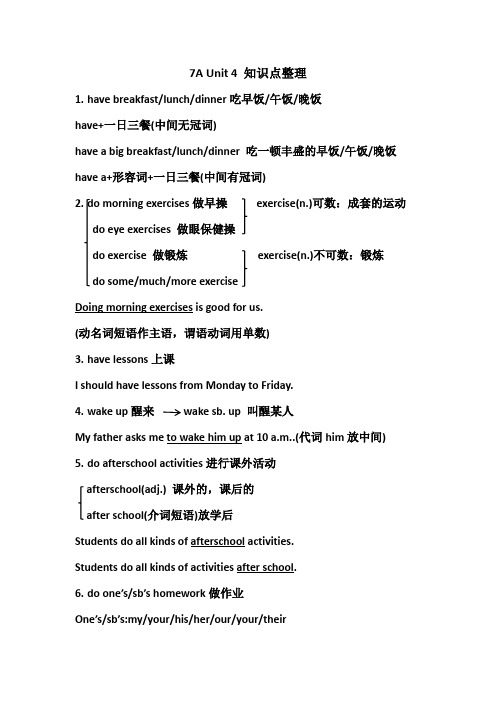
7A Unit 4 知识点整理1.have breakfast/lunch/dinner吃早饭/午饭/晚饭have+一日三餐(中间无冠词)have a big breakfast/lunch/dinner 吃一顿丰盛的早饭/午饭/晚饭have a+形容词+一日三餐(中间有冠词)2.do morning exercises做早操exercise(n.)可数:成套的运动do eye exercises 做眼保健操do exercise 做锻炼exercise(n.)不可数:锻炼do some/much/more exerciseDoing morning exercises is good for us.(动名词短语作主语,谓语动词用单数)3.have lessons上课I should have lessons from Monday to Friday.4.wake up醒来wake sb. up 叫醒某人My father asks me to wake him up at 10 a.m..(代词him放中间) 5.do afterschool activities进行课外活动afterschool(adj.) 课外的,课后的after school(介词短语)放学后Students do all kinds of afterschool activities.Students do all kinds of activities after school.6.do one’s/sb’s homework做作业One’s/sb’s:my/your/his/her/our/your/their肯定句:She often does her homework in time.疑问句:Does she do her homework in time?否定句:She doesn’t do her homework in time.7.go to bed去睡觉Young people often go to bed late.8.be late for迟到Don’t be late for school tomorrow.(Don’t do sth.祈使句否定) 9.at a quarter past eight 在8:15(past几点过了几分)at 8:30/at 6 years old/at Christmas/at noon/at night/at lunch (at+时刻/年龄/不以Day结尾的节日/固定搭配)10.It is time for sth.=It is time to do sth.到了做...的时间It is time for dinner.=It is time to have dinner.It is time for sb. to do sth. 对于某人来说到了做...的时间It is time for us to do more exercise.11.Shall we do sth.? 让我们做...可以吗?Let’s do sth., shall we? 让我们做...可以吗?What/How about doing sth.? 做...怎么样?提出建议Why not do sth.? 为什么不做...呢?Why don’t you do sth.? 为什么不做...呢?12.go walking去散步go running/swimming/shopping/fishing: go+Ving去做某事13.go out出去Eddie is lazy, so he seldom goes out.14.need a good rest=need to have a good rest需要好好休息need sth./need to do sth. 需要.../需要做......After doing some afterschool activities, I need a good rest.After doing some afterschool activities, I need to have a good rest.15.how to have fun如何玩乐(特殊疑问词+to do sth.)Some dogs just don’t know how to have fun.16.have (lots of/great) funhave a good/great/wonderful time 玩得开心enjoy oneself(myself/yourself/himself/herself/...)have fun doing=have a good time doing做...很开心They have fun watching basketball matches on TV.They have a good time watching basketball matches on TV.17.start/begin to do sth. 开始做某事We start/begin to have lessons at eight in the morning.18.from Monday to Friday 从周一到周五19.do morning exercises first 先做早操20.my favourite subject 我最喜爱的科目21.chat with each other(chatchatting) 彼此聊天Girls enjoy chatting with each other after class.22.in the morning/afternoon/evening 在早上/下午/晚上in the morning/in 2022/ in October/in autumn(in+一天的早中晚/年份/月份/季节)23.have a Reading Club 有一个阅读俱乐部24.on Thursday afternoon 在周四下午on Sunday/on October 1/ on the morning of October 1/ on a cold winter morning/on Children’s Day(on+星期/日期/具体某一天的早中晚/以Day结尾的节日)25.be in the school volleyball team 在学校的排球队=be a member of the school volleyball teamSimon is in the school volleyball team.=Simon is a member of the school volleyball team.26.practise doing sth. 练习做某事Millie and Sandy like practising playing volleyball after school.27.have much time to do sth. 有许多时间做某事have time to do sth. 有时间做某事have enough time to do sth. 有足够的时间做某事have little time to do sth. 几乎没有时间做某事have no time to do sth. 没有时间做某事28.go to her dancing lessons 去上舞蹈课29.dance for half an hour 跳舞半小时(for+一段时间)30.go roller skating 去溜旱冰31.Wish our team good luck. 祝我们的队好运。
牛津译林版英语七年级上册第四单元重点知识梳理
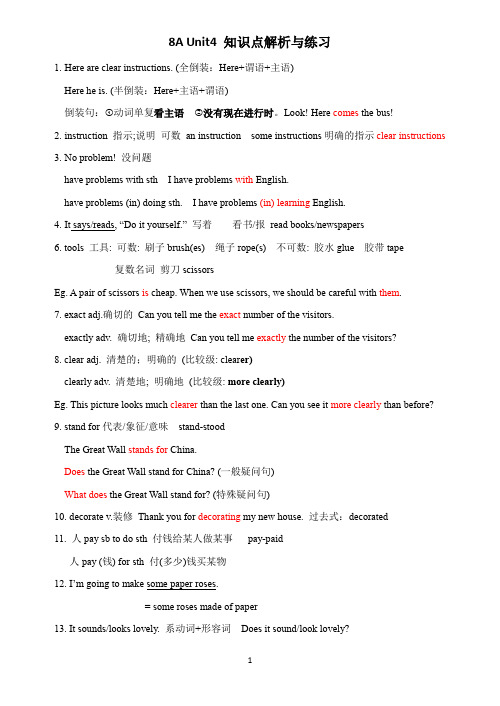
8A Unit4 知识点解析与练习1.Here are clear instructions. (全倒装:Here+谓语+主语)Here he is. (半倒装:Here+主语+谓语)倒装句:①动词单复看主语②没有现在进行时。
Look! Here comes the bus!2.instruction 指示;说明可数an instruction some instructions明确的指示clear instructions3.No problem! 没问题have problems with sth I have problems with English.have problems (in) doing sth. I have problems (in) learning English.4.It says/reads, “Do it yourself.”写着看书/报read books/newspapers6. tools 工具: 可数: 刷子brush(es) 绳子rope(s) 不可数: 胶水glue 胶带tape复数名词剪刀scissorsEg. A pair of scissors is cheap. When we use scissors, we should be careful with them.7. exact adj.确切的Can you tell me the exact number of the visitors.exactly adv. 确切地; 精确地Can you tell me exactly the number of the visitors?8. clear adj. 清楚的;明确的(比较级: clear er)clearly adv. 清楚地; 明确地(比较级: more clearly)Eg. This picture looks much clearer than the last one. Can you see it more clearly than before?9. stand for代表/象征/意味stand-stoodThe Great Wall stands for China.Does the Great Wall stand for China? (一般疑问句)What does the Great Wall stand for? (特殊疑问句)10. decorate v.装修Thank you for decorating my new house. 过去式:decorated11. 人pay sb to do sth 付钱给某人做某事pay-paid人pay (钱) for sth 付(多少)钱买某物12. I’m going to make some paper roses.= some roses made of paper13. It sounds/looks lovely. 系动词+形容词Does it sound/look lovely?14. 行为动词need:(1)need sth (2)need to do sth (3)need sb to do sth (4)need ...for sth情态动词need:needn’t do sth 不必Eg. You don’t need to do exercise every day. = You needn’t do exercise every day.15. be crazy about sb./sth./doing sth. 对…着迷crazy-crazier- the craziestEg. My mother is crazy (痴迷的) about making paper roses in my family.16. finish sth./ doing sth. 结束某事17. terrible adj. 可怕的That sounds/looks terrible.terrible-terribly adv. 可怕地;非常,极度地Eg. Be terribly ill/hurt I’m terribly sorry for being late.18. try to do sth. 努力/试图/设法做某事try not to do sth. 尽量不要做某事19. put in sth. 安装(门,窗,灯, 淋浴器...)put -putting put - put(过去式)put up 张贴,悬挂,举起,搭建put up a notice/a poster/a picture/ your hands/ a tent/ a shelf put out 扑灭put on 穿上;戴上put away 收起来,整理好put off 推迟Eg. 在他安装了一盏更亮的灯之后,他的整座房子停电了。
- 1、下载文档前请自行甄别文档内容的完整性,平台不提供额外的编辑、内容补充、找答案等附加服务。
- 2、"仅部分预览"的文档,不可在线预览部分如存在完整性等问题,可反馈申请退款(可完整预览的文档不适用该条件!)。
- 3、如文档侵犯您的权益,请联系客服反馈,我们会尽快为您处理(人工客服工作时间:9:00-18:30)。
7A Unit 4基础练习一姓名_________
翻译句子(p42)
1.艾迪,起床。
__________________________________________
2.是吃早饭的时间了吗?__________________________________________
3.我们去山里散步好吗?__________________________________________
4.不,我很少出去。
__________________________________________
5.在早饭后,我睡觉,然后我吃午饭。
__________________________________________
6.在午饭后,我总是需要休息一下。
__________________________________________
7.有些狗就是不知道怎样玩乐。
__________________________________________
8.米莉写信给她的网友关于她的学校生活。
______________________________________
9.她也写了在学校喜欢的和不喜欢的事情。
______________________________________
10.告诉你的朋友关于你在校的一天__________________________________________
11.及你喜欢或不喜欢的事__________________________________________
填空并能表演
A; _______ _______ ,Eddie!
B:Is it time _________breakfast?
A;__________we go walking in the _________?
A:No,I __________ go_________, After ___________, I sleep, and then I have _______, After lunch, I _________ need a_________ __________.
B:Some dogs_________ don't________ how________ have f__________.
重点词组
1.把他叫醒__________________________________________
2.该上学了(写出两个)__________________________________________
3.我们打排球好吗?(shall)__________________________________________
4.我饿了,需要一个苹果。
__________________________________________
5.我累了,需要好好休息(写出两个)__________________________________________
6.我不知道如何学好英语。
__________________________________________
7.我知道何时上电脑课。
__________________________________________
8.玩得开心(写出两个句子)__________________________________________
7A Unit 4基础练习二姓名_________
翻译句子(p43)
1.在校的一天__________________________________________
2.看Millie’s时间表__________________________________________
3.我每天早上在6:30起床__________________________________________
lie每天骑车上学__________________________________________
5.做早操__________________________________________
6.上课__________________________________________
7.做课外活动__________________________________________
8.吃晚饭__________________________________________
9.我每天花2小时做作业__________________________________________
10米莉,你每天什么时候去学校?__________________________________________
11.我通常在7点20去学校。
__________________________________________
12.我上学从来不迟到。
__________________________________________
13.你们什么时候开始上课?八点一刻。
__________________________________________
14.你喜欢上学吗?是的。
我非常喜欢它。
__________________________________________ 填空
Aunt: Millie, __________ do you go to school ________ day?
Millie: I _________ go to school at 7:20. I'm ________ late ________ it.
Aunt: Good . What time do you________ _________?
Millie:At a ________ _________ eight.
Aunt:Do you ________school, Millie?
Millie:Yes I enjoy it _______ _________.
翻译
1.在7:20上学__________________________________________
2.我从来不迟到__________________________________________
3.开始上课__________________________________________
4.八点一刻__________________________________________
5.我非常喜欢学校__________________________________________。
